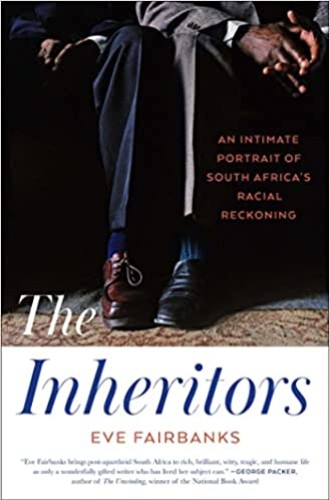Cheap grace in South Africa
Eve Fairbanks traces the experiences of three South Africans to diagnose the country’s unrealized promises.
Dietrich Bonhoeffer warned Christians about the perils of cheap grace, which he defined as “the preaching of forgiveness without requiring repentance, baptism without church discipline, Communion without confession . . . grace without discipleship, grace without the cross, grace without Jesus Christ.” Most people have an idea of what cheap grace looks like at an individual level. Eve Fairbanks shows us what happens when cheap grace becomes a national policy.
The Inheritors tells the troubled racial, cultural, and political history of South Africa through the embodied experiences of three average South Africans: Dipuo, an anti-apartheid Black activist; her daughter Malaika, born after the end of apartheid; and Christo, a White South African who fought for the apartheid regime. Fairbanks guides readers into the social turmoil of South Africa through these three individuals’ experiences.
Read our latest issue or browse back issues.
Dipuo’s life shows us the strength she summoned to navigate her longing for Black liberation within her community and beyond. We feel the injustice she experiences, her joy of new hope, and the frustrations of her postapartheid reality. Christo shows us what it was like to be one of the last White South Africans drafted to defend the White ruling regime. We see his confusion as the racial caste system that upheld his world ended overnight. His life confirms the adage that when you are used to privilege, equality can feel like oppression. Malaika shows us South Africa through the eyes of a generation born into the promise of freedom and equality but never experiencing it in real life.
Fairbanks weaves South Africa’s colonial history throughout the lives of Dipuo, Christo, and Malaika, enhancing their stories with anecdotes from the hundreds of people she interviewed. Readers unfamiliar with South African history will learn how a White minority created a racially separate and very unequal nation, maintaining the system through violent force. The end of apartheid was received with mixed emotions, Fairbanks shows.
What happens when oppressed people are given power over their oppressors? The answer came quickly. Newly elected president Nelson Mandela and archbishop Desmond Tutu formed the Truth and Reconciliation Commission to provide a path for the future. The TRC used restorative justice practices to expose the truth of the past and then encouraged victims and perpetrators to live in peace. Rather than punishment, perpetrators who participated in this work were given amnesty. South Africa was hailed globally as a success story in racial reconciliation.
At the heart of The Inheritors is the story of how South Africans made sense of their lives under these new conditions. In a 2022 report by the World Bank, South Africa ranked as the most unequal country in the world, with race being the most important determinant of wealth. After apartheid ended, the economic power of White South Africans increased disproportionately. The equality that Black South Africans longed for never materialized. Racial violence continues to plague the country, and it has spilled over to xenophobic violence against Africans and immigrants from other countries.
Grace, even cheap grace, is never offered maliciously. The TRC demonstrated exemplary moral commitment in the grace it showed White South Africans who committed racial crimes. However, its focus on individual confessions failed to address the systems that created the injustice. Institutions and cultures, like machines, do not care about the complexion of their operators’ skin; they will do what they were designed to. South Africa’s politics, economy, and culture were set up to benefit the few and oppress the many. The TRC’s failure to dismantle those systems ensured their replication even when the once-oppressed were in power.
This is not a book about simple villains and victims or winners and losers. As Fairbanks describes the complexities and contradictions of South Africa’s postapartheid social system, she avoids fetishizing the evil done to Black South Africans and forces readers to contend with the evil that White supremacy does to all people. The deep wounds that Christo and his fellow White South Africans carry because of their racism are on full display.
In his 2019 book Dying of Whiteness, physician Jonathan M. Metzl argues that White Americans’ quest for supremacy has led them to support policies that result in their own death. Fairbanks shows that this commitment to die for Whiteness is as global as the senseless quest for White supremacy. Living in South Africa is a daily reminder that White people got away with centuries of racial violence, and many can’t live with this reality. One White South African told Fairbanks, “The Bible was right about a thing or two, it is infinitely worse to receive than to give, especially if the gift is mercy.” Therein lies the peril of cheap grace. It turns an act of kindness into a curse.
South Africa holds important lessons for the United States. The racial reconciliation movement in American Christianity, which nearly took on the stature of the gospel in the 1990s, was built on the premise of cheap grace. Christian leaders told Black and White people to forgive each other and move on. A generation later, White Christian nationalism is ruling the public discourse and tearing the country apart. Forgiveness without repentance cannot build a peaceful world. The road to justice requires real sacrifice from all involved.
One of the most important contributions of The Inheritors may also be one of the most frustrating. Fairbanks does not tell a moral fable with an easy take-home message. Her beautiful writing captures the ambivalence and instability of modern South Africa, mirroring much of the dissatisfaction we feel in the United States.
Still, we get glimpses of cautious optimism. The ambivalence that Fairbanks uncovers can be received as a sign of hope, an assurance that the story is not finished. Perhaps we can write the next chapter as a future where sinners learn to offer—and, maybe more importantly, receive—costly grace.






